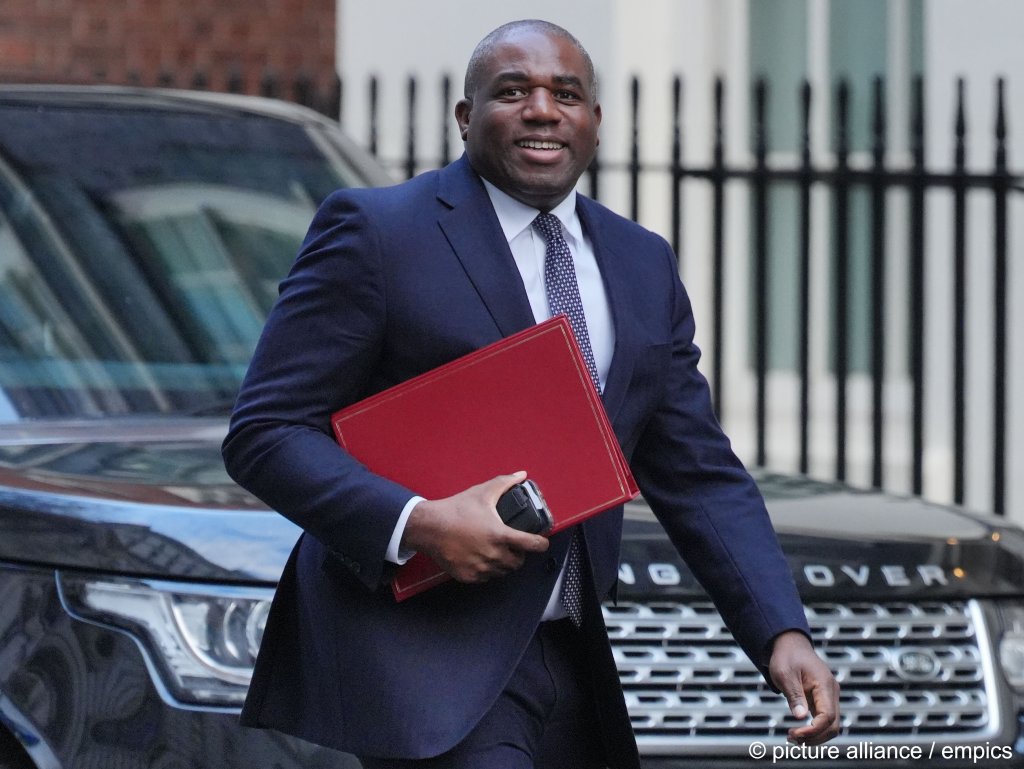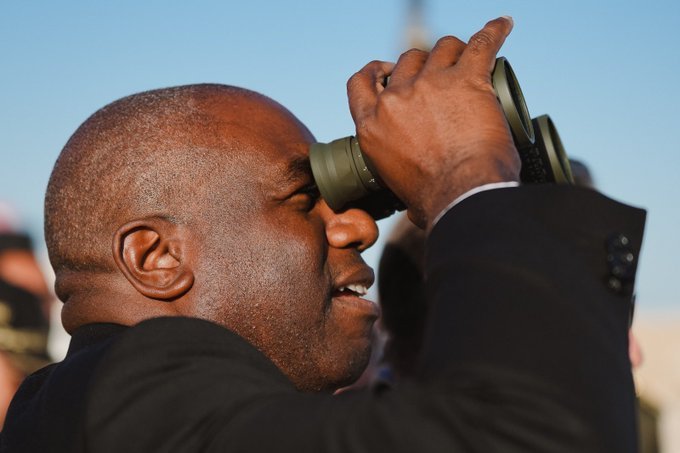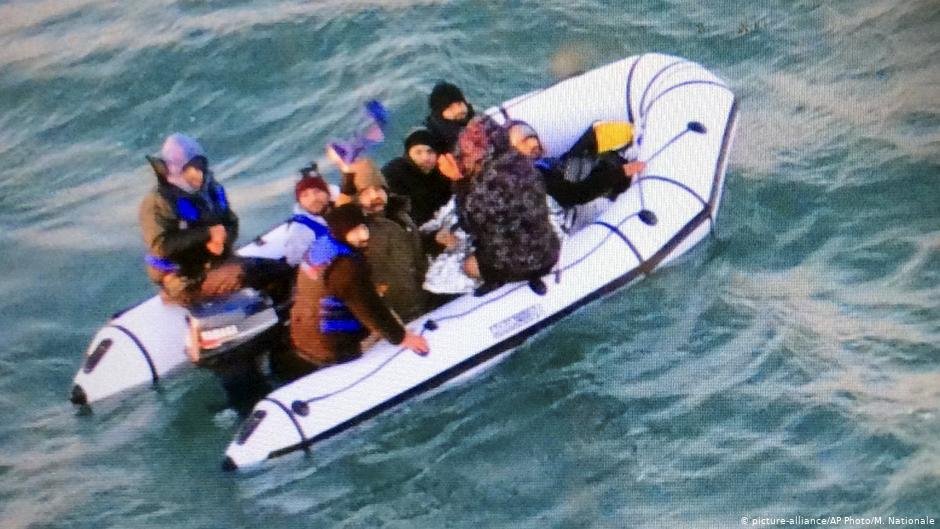The UK government announced a multi-million-pound deal with Tunisia on Friday to "target the root causes of migration." Britain’s Foreign Secretary announced new funding for programs in Tunisia "to smash the gangs" and "secure UK borders."
UK Foreign Secretary David Lammy announced new funding and programs on Friday (January 31) during a visit to Tunisia. He stated that the funding aims to address the root causes of migration and offer alternatives to the drivers of small boats crossing the Mediterranean towards Europe.
In a post on X published January 31, Lammy wrote: "Using UK-supplied cutting edge drones and night vision, the Tunisian National Maritime Guard are dissuading perilous journeys by sea."
He added the National Guard was helping to "smash the gangs and save lives." According to Lammy, "the numbers don’t lie." Lammy claimed that the Tunisian authorities have "saved more than 66,000 people and seized 1,400 boats last year."
Lammy posted a video on the social media platform X showing him observing the work of the Tunisian National Guard and their deployment of British-supplied drones.
The funding and announcements come as Britain’s Labour government presented a new immigration bill in parliament on Thursday (January 30), which aims to repeal many of the former Conservative government’s initiatives contained within the "illegal migration bill."
Plan for change
The British government hopes that the projects in Tunisia will help to "educate and upskill would-be migrants to become more employable in their home country," as well as supporting reintegration projects for third-country migrants wishing to leave Tunisia and return to their own countries.
The British government has put this funding in an overall "Plan for Change" which they say will help to protect the UK"s borders and reduce overall migration.
Although the UK does not share any borders with Tunisia, this new direction in policy is about trying to prevent migrants from crossing the Mediterranean before they end up on the Channel coasts.
Read Also99 migrants rescued in English Channel
New spending package
David Lammy unveiled a new spending package of "up to five million pounds" (around six million euros), which he said would boost programs already in place to upskill migrants, aiming to reduce the likelihood of migration.

The UK will also add up to one million pounds (around 1.2 million euros) of funding to the International Organization for Migration’s Assisted Voluntary Returns and Reintegration (AVRR) program. The program helps third-country migrants who had been attempting to transit Tunisia towards Europe but have no legal right to remain there. AVRR’s program will then offer the possibility of return and reintegration in their home country.
Lammy said he hoped the funding would help improve migrants' living standards in their home country, which would, he believes, make them "less likely to make a perilous journey to the UK." He said that by paying smugglers, migrants were enriching criminal gangs that were seeking to exploit the UK’s immigration system.
Britain’s Foreign Secretary traveled to Tunisia with the Border Security Commander Martin Hewitt, where the two men met their Tunisian counterparts to talk about how they could strengthen their cooperation, fight against people smuggling and "irregular migration."
Read AlsoTunisia under harsh criticism for anti-migrant measures
British-supplied drones and night-vision goggles
The two UK officials also met with members of the Tunisian National Guard "who are using UK-supplied drones and night vision technology to intercept small boats carrying irregular migrants under cover of darkness," according to a UK government press statement.

Lammy added that the UK’s support was intended to "save lives, bring down migration levels, and help us bear down on those responsible for smuggling migrants into the UK."
Martin Hewitt explained that "international partners like Tunisia play a vital role in the UK’s efforts to combat irregular migration, organized immigration crime and the harm both cause to communities at home and abroad."
A series of bilateral agreements, new migration bill
The government press release said the Tunisia agreements were one in a series of bilateral initiatives the UK government has been taking to reduce migration and migrant smuggling. In January, similar initiatives were undertaken between the UK and Iraq, and the UK, along with other G7 nations.
Hewitt added that the introduction of the UK’s latest immigration bill, entitled the "Border Security, Asylum and Immigration Bill," to parliament was intended to help further strengthen Britain’s relationships with international partners, as well as "empowering teams on the ground to go further and act faster when dismantling organized criminality."
The new bill is intended to be a "turning point for law enforcement, allowing them to take earlier and more effective action against organized immigration crime," continued the statement. The bill is inspired by powers normally used to combat terrorism. In 2024, claims the British government, it "successfully removed the highest number of irregular migrants since 2018."
Read AlsoThree suspected smugglers arrested in Iraqi Kurdistan as UK and Iraq sign new migrant return deal
Opposition criticizes bill
On Monday (February 3), right-leaning UK media, including The Daily Telegraph and GB News, reported comments from Conservative shadow Home Secretary Chris Phipps, who accused the government of being a "soft touch" when it came to migration policy.
Phipps was quoted by GB News as saying that UK Prime Minister Sir Keir Starmer is "weak on borders and is weak when it comes to protecting our borders and our people." Phipps added that he would "fight tooth and nail against this craven capitulation to illegal immigrants and people-smugglers when the bill comes to parliament."
The possibility of repealing parts of the 2023 Illegal Immigration Bill has angered right-wing Conservatives, with GB News reporting claims that the government is "decriminalizing illegal migration." Former Home Secretary Suella Braverman called the bill a "disgrace" and an "insult" to Britons, insisting that anyone entering the UK "illegally,…should be detained, deported, and banned from ever returning."

Criticism comes from NGOs and migrant charities too
The bill has also come under fire from NGOs and charities that work with migrants. One proposal contained within the bill states that migrants refusing the offer of rescue by the French authorities could face up to five years in prison. Currently, the French authorities will go to the aid of a migrant boat off the coast. Anyone wishing to be taken off the boat is helped, but anyone wishing to stay on the vessel and continue towards the UK is also allowed. The French authorities say that trying to remove people from a boat at sea could be dangerous and might result in loss of life.
Charities and NGOs believe these proposals risk "criminalizing" people who are seeking asylum. Another part of the bill suggests that parents who bring their children to the UK by small boat could also face prosecution, leading to the possibility that families could be split.
Enver Solomon, the chief executive of the Refugee Council, told the Guardian: "We are very concerned that by creating new offenses, many refugees themselves could also be prosecuted, which has already been happening in some cases. This would be a gross miscarriage of justice."
Solomon added: "Criminalising men, women and children who have fled conflicts in countries such as Sudan does not disrupt the smuggling gangs' business model. When a refugee is clambering into a boat with an armed criminal threatening them, they are not thinking about UK laws but are simply trying to stay alive."
